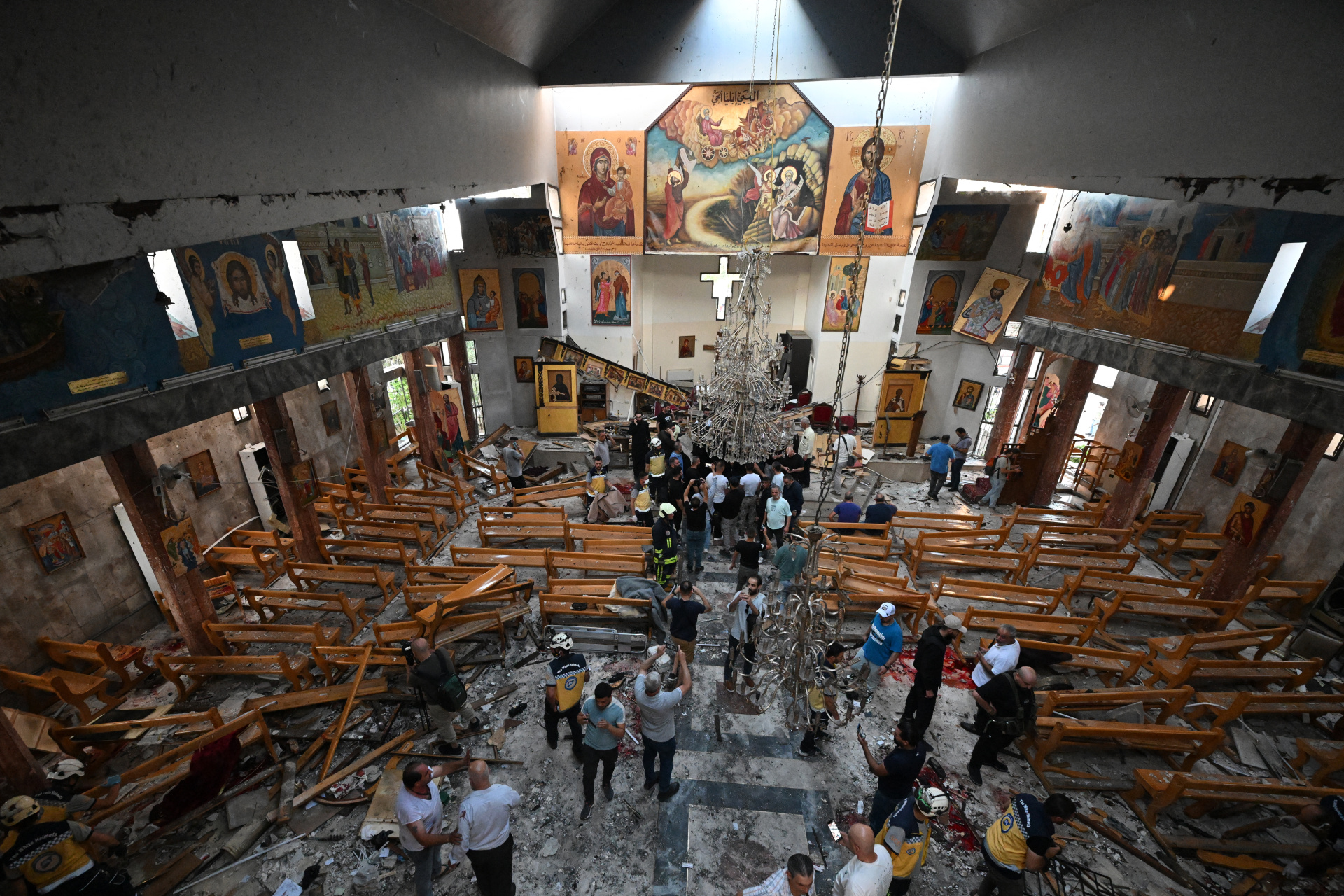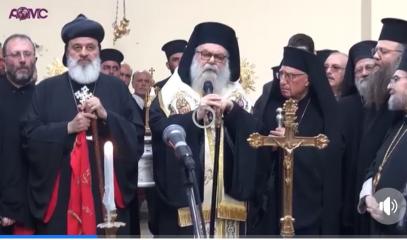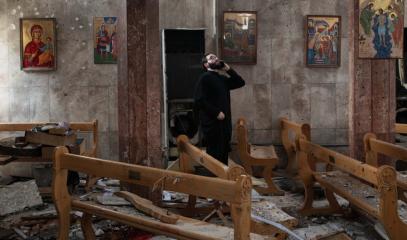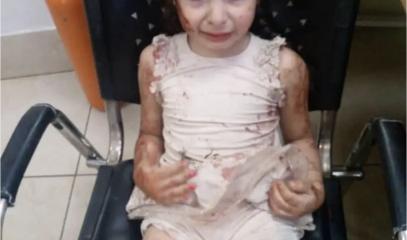Damascus: in Saint Elias, the day after the Christian “martyrs”
This afternoon, the funerals of the victims of the massacre were presided over by Greek Orthodox Patriarch John X Yazigi. The Christian community is still in shock, entire families decimated. Syrian authorities have arrested six people linked to the attack and promise justice. But the climate of mistrust remains and the desire to flee in a ‘security vacuum’ is growing.
Beirut (AsiaNews) - The Christian community in Syria is preparing for the funeral, scheduled for this afternoon, of the victims of the massacre at the Greek Orthodox cathedral of Mar Elias on 22 June at the hands of a suicide bomber, a new ‘martyrdom’ of Christians in many ways similar to that which took place in Baghdad in 2010.
The funeral was announced by the patriarch of the Greek Orthodox community, John X Yazigi, who yesterday visited the place of worship in the Dwelah district of Damascus, where the suicide attack took place, accompanied by the Greek Catholic and Syriac Orthodox primates.
The carnage claimed the lives of at least 30 worshippers and left nearly 90 wounded, dozens of them seriously and hospitalised, according to the latest reports.
Among those who have expressed their condolences in recent hours is the Chaldean Patriarch of Baghdad, Cardinal Louis Raphael Sako, who expressed his ‘support’ for the families of the victims and the wounded ‘of the sister Church’..
In a note sent to AsiaNews, Monsignor Samir Nassar, Maronite Archbishop of Damascus, explains that ‘the explosion at the Orthodox Church sends three messages: to discredit the new regime, which would like to establish relations with Christians; to give new vigour to terrorist Islam; to send a message to Russia, which has massacred Muslim cities and protected Greek Orthodox Christians since the 19th century’.
According to reports published in recent hours, the victims were hit by bullets and explosives fired by one or two jihadist militants, identified by the Syrian Interior Ministry as members of the Islamic State (ISIS), the only group believed capable of such extreme acts. Reacting quickly to the attack, the Syrian authorities announced yesterday that they had arrested six people ‘involved’ in the attack, according to a dispatch released by AFP in Damascus.
According to the same source, two other militiamen ‘involved’ were killed. The announcement of the arrests came a few hours after the official statement by interim Syrian President Ahmad al-Sharaa, who promised to bring to justice those connected in any way with the massacre, which he described as “heinous”.
The Interior Ministry in Damascus explained in a statement that ‘several criminals involved in the attack on St. Elias Church (have) been arrested’. “Explosive belts, mines ready to be detonated and a motorcycle packed with explosives” were seized “from a hideout during a security operation targeting Daesh cells” in the capital region.
‘These operations led to clashes during which the cell leader and five members were arrested, while two others were killed: one,’ the ministry statement continued, ‘was the main planner of the suicide bomber's entry into the church, the other was preparing a terrorist attack in a neighbourhood of the capital.’
However, there are other elements that would suggest a different origin: the Saraya Ansar al-Sunna group, formed by HTS defectors, has officially claimed responsibility for the attack and denies that any of those responsible for the massacre have been arrested. Although not allied with ISIS, the movement shares its ideology and considers Christians a legitimate target for their ‘provocative actions.’
Furthermore, according to a video circulated yesterday, about a month ago, some pro-Islamic State jihadists arrived in a car equipped with loudspeakers to preach conversion to Islam in the courtyard of the Church of Saint-Georges.
They were repelled by men from this predominantly Christian neighbourhood. After the attacks against the Alawites in March and the Druze in April, Sunday 22 June's attack could be, for many Syrian Christians, the final blow to their presence in Syria; the breaking point that marks the end of the trial period granted to the Islamist regime that overthrew Bashar al-Assad's dictatorship. 'My Lord, this land has become uninhabitable. Can you find a country where we do not feel in danger every day?‘
This is the appeal that Greek Orthodox bishops are hearing more and more often from the mouths of fed-up faithful. This does not prevent Christians from repeating that their right to Syrian soil predates the arrival of Islam in the 7th century and that they are the descendants of St. Paul, who converted ’on the road to Damascus."
Confusing accounts
Accounts of the massacre are confusing and sometimes contradictory. According to the video of Patriarch John X's arrival at the scene, the suicide bomber blew himself up a few metres from the church entrance after being thrown to the ground by brave worshippers who tried to wrestle the weapon from him, which he then took away and detonated, killing himself. ‘At first I heard the sound of bullets, I wanted to run away but I couldn't: the terrorists came in and started shooting. They shot at us,’ 15-year-old Joulian Nakoula told L'Orient-Le Jour (LOJ).
The young man was shot three times: once in the knee, once in the hip and once in the right hand. He lost consciousness before waking up in the ambulance that was taking him to the central hospital in Damascus.
From his hospital bed, he recounts the horror: ‘It was a horrible scene, my hands were bleeding. I thought it was over.’ Joulian's father, Hanna, wants to leave the country. ‘There was no one to protect the church, to protect our children,’ he accuses.
At his son's bedside, he struggles to speak, his gaze lost: ‘I don't understand what's happening.’ Today, the boy was supposed to take his high school exams. According to Greek Orthodox sources in Lebanon, the attack decimated an entire family and only a 10-year-old child survived.
Calming spirits
For Vincent Gélot, director of Œuvre d'Orient in Lebanon and Syria, this attack is ‘extremely serious.’ ‘This new attack will leave its mark on the Christian community,’ he continued, because ‘it revives the pains of the past, in particular the attack on the Syrian Catholic cathedral in Baghdad on 31 October 2010.’ Vincent Gélot spoke of the climate of insecurity ‘that is suffocating Christian minorities, who are increasingly isolated, unarmed and vulnerable.’
Since the start of the Syrian conflict in 2011, the Christian population has fallen by 70%. Some estimate that only 300,000 Christians remain in Syria. ‘Since the fall of the regime, there has been a huge security vacuum. And Christians, who have no militias, are an easy target,’ concluded the expert and activist, hoping that the crackdown announced by the Syrian Interior Ministry will help calm the unrest.
11/08/2017 20:05










.png)










